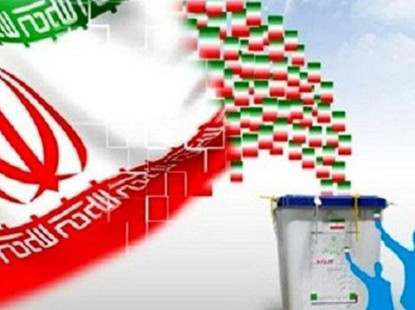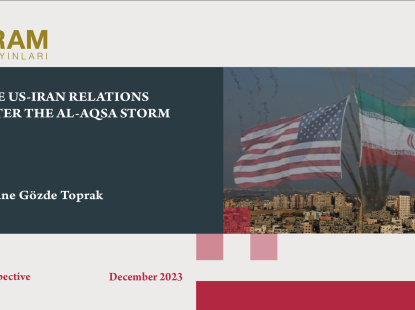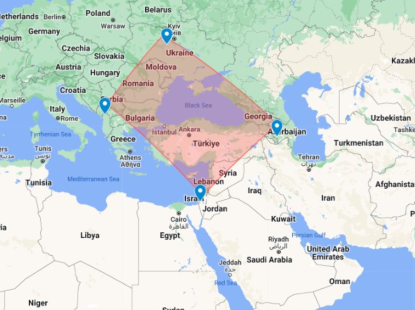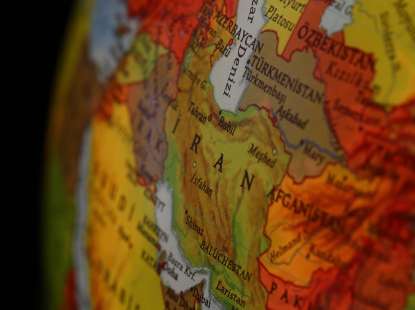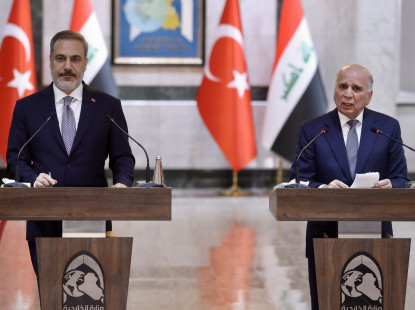The Political Dimension of the Israel-Lebanon Maritime Border Deal
The recent history of the Middle East has witnessed ambitious but not long-lasting peace initiatives involving Israel with the encouragement of the USA. The primary attempt among these is the 1979 Egypt-Israel Peace Agreement. Egyptian President Anwar Sadat and Israeli Prime Minister Menachem Begin signed the Camp David Accords in 1978 in the presence of Jimmy Carter, the then-US President. Then, a year later, they signed Egypt-Israel Peace Agreement in Washington on March 26, 1979. While Egypt has been the first Arab country to recognize Israel as a state, this development cost Sadat his life. Sadat was assassinated on October 6, 1981.
Another peace initiative led by the USA is the Oslo Accords. On September 13, 1993, hosted by then-US President Bill Clinton, Israeli Prime Minister Yitzhak Rabin and Palestine Liberation Organization (PLO) Chairman Yasser Arafat symbolically announced the Oslo 1 Accord between Israel and the PLO by shaking hands. However, this development cost Rabin his life. On November 4, 1995, Rabin was murdered by a far-right ultra-orthodox.
In the context of these facts, it should be noted that it is a controversial issue to what extent the attempts of the USA to ensure the security of Israel, its most important ally in the Middle East, have provided the intended result for the country. While one of the main motivations of President Barack Obama when entering the Joint Comprehensive Plan of Action (JCPOA, Nuclear Deal) process was to ensure the security of Israel, his successor Donald Trump claimed that the Nuclear Deal created a security problem for Israel, and it enabled Iran to be more active in the Middle East through its proxies. As a result, he withdrew from the Deal in 2018. Subsequently, Trump led the signing of the Abraham Accords, which started Israel's diplomatic relations with Bahrain and the United Arab Emirates (UAE) on September 15, 2020.
It is obvious that Joe Biden, who was elected US President on November 3, 2020, has differed sharply from his predecessor Trump's Middle East vision. Even though he stated that the Abraham Accords was a successful initiative, it is known that Biden sees the Accords as a reflection of the close relationship between Trump and then-Israeli Prime Minister Benjamin Netanyahu, and he is not satisfied with a peace initiative in which Trump's name is prominent. This motivation paved the way for Biden to pioneer the signing of the Maritime Border Deal between Israel and Lebanon by taking advantage of Naftali Bennett and Yair Lapid taking office and becoming prime ministers after Netanyahu in Israel. Thus, it was announced that an agreement had been reached between the two countries on October 11.
This Deal, which has not yet been formalized, is essentially an energy agreement. As a matter of fact, the person who pioneered the emergence of the Deal is Amos J. Hochstein, who leads the Bureau of Energy Resources in U.S. Department of State and also serves as the Special Envoy and Coordinator for International Energy Affairs. Nonetheless, the remarks and debates that emerged in the USA, Israel, and Iran on the axis of the Deal indicate that it is not only an energy deal but will also have political consequences.
Arguments of the Supporters and Opponents of the Deal
In conventional US politics, relations with Israel have been a nonpartisan issue. Still, the US domestic politics, which has been crystallized in many ways recently, has also experienced a critical split over the Israel-Lebanon Maritime Border Deal. Moreover, this split has also found response in Israeli domestic politics. Considering that there will be congressional midterm elections on November 8 in the USA and parliamentary elections in Israel on November 1, the announcement of this Deal by Biden and Lapid before the elections does not have only a foreign policy purpose. It also serves a domestic political goal. Thanks to this Deal, both politicians have a chance to present a success story that will strengthen their hands against their rivals.
The prominent argument of the supporters is that the Deal brought Lebanon and Israel to the table on the axis of an agreement, and it is significant considering that the two countries have been officially at war since 1948 and last experienced a military conflict in 2006. In addition, the Deal is expected to strengthen the Lebanese government and economy. Thus, it can help Lebanon to evade Iranian influence, which draws attention as a crucial aspect that the pro-Deal circles prioritize. It is important to note that this idea comes to the fore in the Biden government’s strategy of limiting the relationship between Iran and its proxies in the Middle East. Accordingly, if the economic dependence of Iraq, Syria, and Lebanon, a.k.a. the Axis of Resistance, to Iran reduces, Iranian influence in these areas will also decrease, and a safer environment will be provided for Israel.
In this regard, it should be reminded that Biden requested financial support from Saudi Arabia for Lebanon during his Gulf visit on July 2022, and he made sure that a considerable part was allocated to Lebanon in the final declaration of the Gulf Cooperation Council (GCC) meeting he attended. However, Biden could not get the support he wanted from Saudi Arabia, and he had to settle for a few symbolic initiatives. In this context, the US, Saudi Arabian, and French officials, who came together in New York for the United Nations (UN) General Assembly meeting on September 2022, made a joint statement in which they called for the establishment of a government that could implement the structural and economic reforms that are urgently needed to resolve Lebanon's political and economic crises.
Another issue brought to the fore by those who support the Maritime Border Deal in the USA and Israel is the claim that Hezbollah officially recognizes Israel. Although the agreement was made with Lebanese President Michel Aoun, it was actually Hezbollah that supported him in the background. Hence, according to the supporters, Hezbollah will no longer be a threatening force for Israel.
While both Biden and Lapid have been presenting the Maritime Border Deal to the public as Israel's great achievement through the help of widespread media support, the arguments of those who oppose the Deal are increasing accordingly. The focus of the objections has been the legitimacy given to Hezbollah by the USA. According to those who support this view, Hezbollah, with its threats, enabled the US to put pressure on Israel, and it made the Deal signed. Indeed, on July 2, 2022, Hezbollah sent three unarmed drones to an Israeli Mediterranean gas rig, and Hassan Nasrallah threatened Israel in a televised speech on July 13 by stating that “If you do not give us the rights that our state is asking for ... then we could flip the table on everyone.”
Netanyahu is one of the leading figures who claim that an agreement was reached because of the threats of Hezbollah. In a video message published on his Twitter account, he said Nasrallah threatened Lapid that Hezbollah would attack Israel if the Karish Gas Field were to be operated before signing an indirect gas agreement with Lebanon. In the USA, the Republicans did not support the Deal. Only Republican Darrell Issa, a longtime advocate of peace and diplomacy in the region and a Lebanese American, shared a message of support. Trump, on the other hand, criticized the Israel-Lebanon Maritime Border Deal, which Biden pioneered, without mentioning its name. On October 16, he stated that “No President has done more for Israel than I have” on his own social media application, Truth Social.
Apart from all these, the main question is how Iran has perceived the Deal. Tasnim News Agency, controlled by the Islamic Revolutionary Guard Corps (IRGC), reported the Deal with the following heading: “Why did Israel lose in the border demarcation case with Lebanon?” In the report, it is argued that Lapid is trying to remove the "loser" label from Tel Aviv before the Knesset elections by making statements such as “The border demarcation agreement will secure Israel's interests.” According to the report, there is an important conflict between Netanyahu and the Zionists he represented and Lapid, but the public following the Hebrew media is not aware of this yet. Similarly, Nournews, which is close to Iran's Supreme National Security Council, prepared a video that has the following title: “The Deal on the blue line of Lebanon and the Zionist regime is another victory of the resistance.” In the video, it is stated that “Hezbollah's determined stances and actions prevented the Zionists' dreams of occupying and plundering the common areas with Lebanon and forced the regime to accept Lebanon's historical rights.”
As can be seen, Iran welcomed the Deal quite positively. Considering the systematic relationship Iran has with Hezbollah, it is very significant that Iran acknowledges the Deal as a victory for Hezbollah. While Biden's prominent purpose in the Maritime Border Deal has been to limit Iran's influence in Lebanon, it seems that Iran interprets this Deal as a development that serves its own interests. It supports the arguments of those who oppose the Deal, both in the USA and Israel.
It is obvious that Biden intends to revive the Nuclear Deal after the congressional midterm elections. In addition, he indirectly led Israel and Lebanon to reach an agreement. Israel does not object to the Nuclear Deal as much as it used to, and it has deemed it appropriate to make an agreement with Lebanon and indirectly with Hezbollah under the direction of the USA. On the other hand, Iran responds positively to all these processes within its own context. This new picture inevitably suggests that there is a possibility of the beginning of a different diplomacy process because Hezbollah is one of Iran's most significant proxy forces in the region, and it is a step forward to starting a relationship with Israel. It is not possible for this to happen against Iran's will. Since it is impossible to end the hostility between Iran and Israel in the near future, all of these create the impression that the will to initiate a kind of back-door diplomacy between Iran and Israel is in effect through a process in which Hezbollah is active.




